
The World Bank Group (WBG) is a family of five international organizations that make leveraged loans to developing countries. It is the largest and best-known development bank in the world and an observer at the United Nations Development Group. The bank is headquartered in Washington, D.C., in the United States. It provided around $98.83 billion in loans and assistance to "developing" and transition countries in the 2021 fiscal year. The bank's stated mission is to achieve the twin goals of ending extreme poverty and building shared prosperity. Total lending as of 2015 for the last 10 years through Development Policy Financing was approximately $117 billion. Its five organizations are the International Bank for Reconstruction and Development (IBRD), the International Development Association (IDA), the International Finance Corporation (IFC), the Multilateral Investment Guarantee Agency (MIGA) and the International Centre for Settlement of Investment Disputes (ICSID). The first two are sometimes collectively referred to as the World Bank.

Susilo Bambang Yudhoyono, commonly referred to by his initials SBY, is an Indonesian politician and retired army general who served as the sixth president of Indonesia from 2004 to 2014. A member of the Democratic Party of Indonesia, he served as the 4th leader of the Democratic Party from 2014 until 2020, 8th and 10th coordinating minister of politics and security affairs of Indonesia from 2000 until 2001, and again from 2001 until 2004. He also served as the president of the Assembly and chair of the Council of the Global Green Growth Institute. He was also the former chairman of ASEAN due to Indonesia's hosting of the 18th and 19th ASEAN Summits.
The Berkeley Mafia was the term given to a group of University of California-trained economists in Indonesia who were given technocratic positions under the Suharto dictatorship during the late 1960s. They were appointed in the early stages of the New Order administration. Their work focused on promoting free-market capitalism in Indonesia and reversing many of the progressive economic reforms that had been introduced by the Sukarno government. The economic system in place under the New Order regime was termed crony capitalism due to the vast corruption within the country throughout this period. The Berkeley Mafia, like the Suharto dictatorship itself, aligned with the United States during the Cold War.

Klaus Töpfer is a German politician (CDU) and environmental politics expert. From 1998 to 2006 he was executive director of the United Nations Environment Programme (UNEP).
Delhi School of Economics (DSE), popularly referred to as D School, is an institution of higher learning within the University of Delhi. The Delhi School of Economics is situated in University of Delhi's North Campus in Maurice Nagar. Established in 1949, the campus of the Delhi School of Economics houses the University of Delhi's departments of Economics, Sociology, Geography and Commerce, as well as the Ratan Tata Library. Out of the four academic departments, the Departments of Economics, Sociology and Geography come under the Faculty of Social Sciences, while the Department of Commerce comes under the Faculty of Commerce and Business Studies.

Mahmoud Mohieldin, is an economist with more than 30 years of experience in international finance and development. He is the UN Climate Change High-Level Champion for Egypt. He is an Executive Director at the International Monetary Fund. He has been the United Nations Special Envoy on Financing the 2030 Sustainable Development Agenda since February 2020. He was the Minister of Investment of Egypt from 2004-2010, and most recently, served as the World Bank Group Senior Vice President for the 2030 Development Agenda, United Nations Relations and Partnerships. His roles at the World Bank also included Managing Director, responsible for Human Development, Sustainable Development, Poverty Reduction and Economic Management, Finance and Private Sector Development, and the World Bank Institute; World Bank President's Special Envoy on the Millennium Development Goals (MDGs), the Post-2015 Development Agenda, and Financing for Development; and Corporate Secretary and Executive Secretary to the Development Committee of the World Bank Group's Board of Governors. Dr Mohieldin also served on several Boards of Directors in the Central Bank of Egypt and the corporate sector. He was a member of the Commission on Growth and Development and was selected for the Young Global Leader of the World Economic Forum in 2005. His professional experience extends into the academic arena as a Professor of Economics and Finance at the Faculty of Economics and Political Science, Cairo University and as a Visiting Professor at several renowned Universities in Egypt, Korea, the UAE, the UK and the USA. He is a member of the International Advisory Board of Durham University Business School. He also holds leading positions in national, regional and international research centres and associations. He has authored numerous publications and articles in leading journals in the fields of economics, finance and development.

Sjahrir was a prominent Indonesian political economist. He was officially appointed by President of the Republic of Indonesia, Susilo Bambang Yudhoyono as Economic Adviser in the Council of Presidential Advisers on 11 April 2007. As a student activist, he was once sentenced to jail during the Malari demonstration in 1974.

Mohammad Sadli was a leading Indonesian policy-maker and economist.
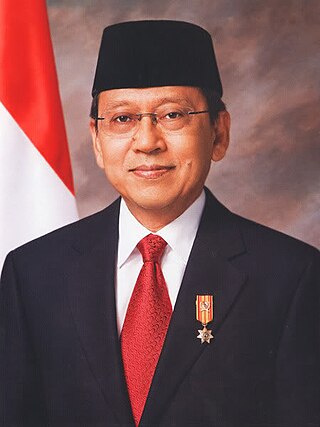
Boediono is an Indonesian economist and statesman. He was the 11th vice president of Indonesia, in office from 2009 to 2014. He became vice president after winning the 2009 presidential election together with the then-incumbent President Susilo Bambang Yudhoyono. Prior to this he had been the Governor of the Indonesian Central Bank and a professor of economics at Gadjah Mada University.
The School of International Development is a department at the University of East Anglia, Norwich, England. Situated within the Faculty of Social Sciences, the School of International Development has been ranked in the top three British development studies departments.
Angela Cropper of Trinidad and Tobago served as assistant secretary-general and deputy executive director of the United Nations Environment Programme (UNEP). She was appointed to this position by United Nations Secretary-General Ban Ki-moon in November 2007.

Armida Salsiah Alisjahbana is currently the Executive Secretary of the United Nations Economic and Social Commission for Asia and Pacific. She is a professor in the Faculty of Economics, Padjadjaran University, Bandung, and has served as Vice Dean for Academic Affairs in the Faculty. She is a former State Minister for National Development Planning / Head of BAPPENAS in the Second United Indonesia Cabinet under the administration of president Susilo Bambang Yudhoyono.

Prof. Dr. Widjojo Nitisastro was an Indonesian economist, who was known as the main architect of the Indonesian economy during the New Order regime of president Suharto, serving as Minister for National Development (1971–1983) and Coordinating Minister for Economy, Finance and Industry (1973–1983). He was one of Indonesia's best-known and most respected economic policy-makers, both within Indonesia and overseas.
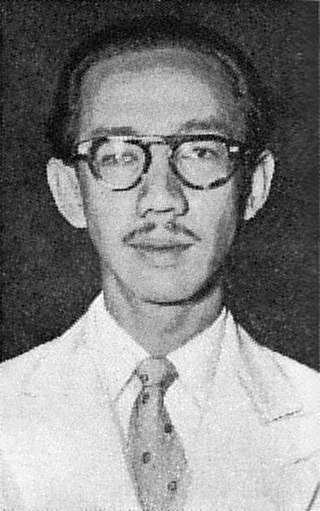
Sumitro Djojohadikusumo was an Indonesian statesman and one of the country's most influential economists. He held ministerial positions under Presidents Sukarno and Suharto intermittently between 1950 and 1978. During his career in government, Sumitro served as Minister of Industry and Trade, Minister of Finance, and the Minister of Research in five different cabinets. He was also the Dean of the Faculty of Economics at the University of Indonesia.

Johannes Baptista Sumarlin was an Indonesian economist who served as Minister of Finance. Sometimes linked with the so-called Berkeley Mafia group of economic advisers which included senior Indonesian economists such as Widjojo Nitisastro, Emil Salim and Ali Wardhana, Sumarlin held various important economics posts in the Indonesian government for many years until the late 1990s. He graduated from the Faculty of Economics, University of Indonesia (FEUI) in 1958. Positions held in government included, among others, Chairman of Supreme Audit Agency, Minister of Finance, Chairman of the National Planning Agency (Bappenas), and Minister for Administrative and Bureaucratic Reform.

Muhammad Chatib "Dede" Basri is an Indonesian economist who served as Minister of Finance in the Second United Indonesia Cabinet between 21 May 2013 and 20 October 2014 during the presidency of Susilo Bambang Yudhoyono. Before his appointment as Minister of Finance he was the head of the Indonesian Investment Coordinating Board.
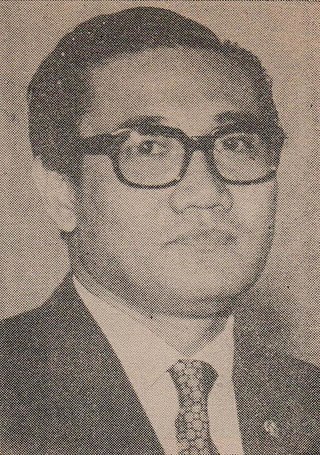
Prof. Dr. Ali Wardhana, more colloquially known as Bung Ali, was an Indonesian professor and economist, who served as the third Coordinating Minister for Economics, Finance, Industry, and Development of Indonesia from 1983 until 1988 and the 21st minister of finance of Indonesia from 1968 until 1983. He was one of Indonesia's most senior economic policy-makers during the New Order regime of president Suharto, being a member of the influential Berkeley Mafia, a group of American educated Indonesian economists who shaped the Indonesian economy during the New Order. He was the longest serving Minister of Finance, as well as the fifth longest serving minister in Indonesian history.
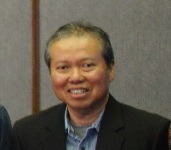
Budy P. Resosudarmo is a professor in development and environmental economics at the Arndt-Corden Department of Economics, Crawford School of Public Policy, at the Australian National University (ANU). He is the head of the ANU Indonesia Project. He was the education director of the Crawford School for the 2021-2022 period and the deputy director of the ANU Poverty and Inequality Research Centre for the 2019-2023 period. Since 2022, he has been a Fellow of the Regional Science Association International.
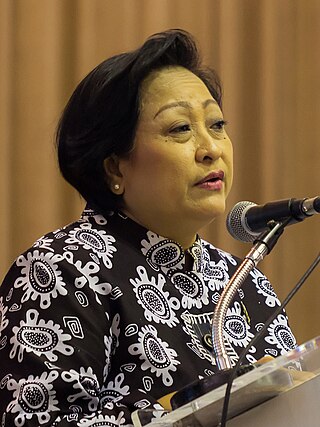
Sri Adiningsih was an Indonesian professor of economics at the Gadjah Mada University who served as the chairperson of the Presidential Advisory Council from 19 January 2015 to 20 October 2019. She had also served as a member of the People's Consultative Assembly ad hoc expert team in 2001 and became the secretary of the Constitutional Commission.















